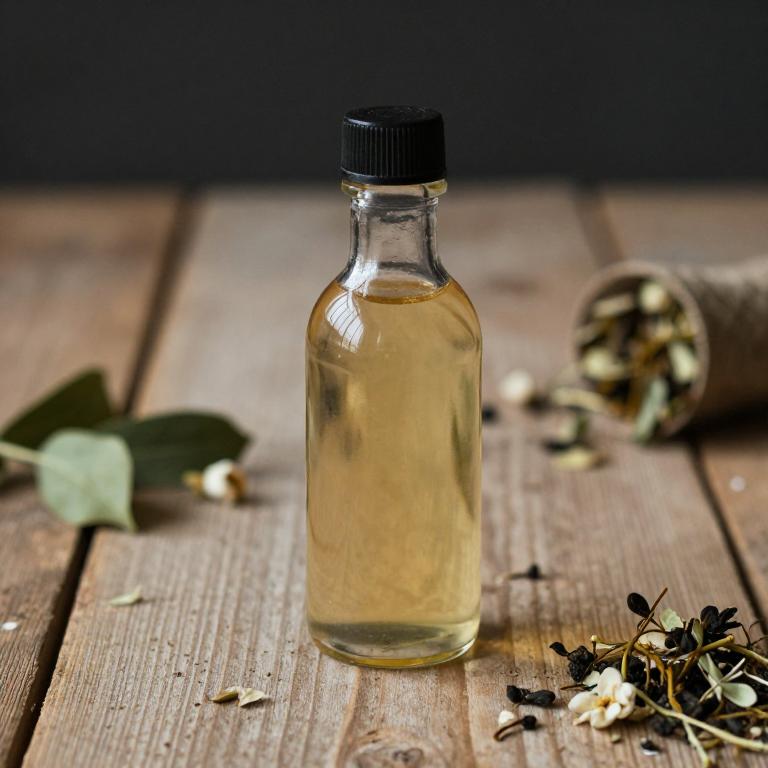10 Best Herbal Syrups For Throat Pain

Herbal syrups are natural remedies commonly used to alleviate throat pain caused by sore throats, colds, or infections.
These syrups often contain ingredients like honey, ginger, echinacea, and licorice root, which have anti-inflammatory and antimicrobial properties. They can soothe irritated tissues and reduce inflammation, providing relief from discomfort. Many herbal syrups are available over-the-counter and are generally safe for adults and children when used as directed.
However, it is advisable to consult a healthcare professional before use, especially for those with allergies or chronic health conditions.
Table of Contents
- 1. Ginger (Zingiber officinale)
- 2. Thyme (Thymus vulgaris)
- 3. Salvia (Salvia officinalis)
- 4. Peppermint (Mentha piperita)
- 5. Licorice (Glycyrrhiza glabra)
- 6. Black elderberry (Sambucus nigra)
- 7. Fennel (Foeniculum vulgare)
- 8. Echinacea (Echinacea purpurea)
- 9. Ceylon cinnamon (Cinnamomum verum)
- 10. Camellia (Camellia sinensis)
1. Ginger (Zingiber officinale)

Zingiber officinale, commonly known as ginger, has been traditionally used for its anti-inflammatory and analgesic properties, making it a popular ingredient in herbal syrups for relieving throat pain.
These syrups often combine powdered or fresh ginger with honey, which enhances their soothing effects and provides additional antibacterial benefits. The warming properties of ginger help to reduce swelling and irritation in the throat, offering natural relief for soreness and discomfort. Many people find that consuming ginger-based syrups can alleviate symptoms of sore throat caused by colds, allergies, or infections.
Due to its natural composition, these syrups are often preferred by individuals seeking alternative or complementary remedies for throat pain.
2. Thyme (Thymus vulgaris)

Thymus vulgaris, commonly known as thyme, is a herb widely used in traditional medicine for its soothing properties.
Thymus vulgaris herbal syrups are popular remedies for throat pain due to their high concentration of essential oils and antioxidants. These syrups contain compounds like thymol and carvacrol, which have antimicrobial and anti-inflammatory effects. The warm, aromatic flavor of thyme syrup makes it an appealing and palatable option for easing sore throat discomfort.
When used as part of a holistic approach, thymus vulgaris syrups can provide natural relief from mild to moderate throat irritation.
3. Salvia (Salvia officinalis)

Salvia officinalis, commonly known as sage, is often used in herbal syrups to alleviate throat pain due to its anti-inflammatory and antimicrobial properties.
These syrups typically contain a combination of sage extract, honey, and other soothing ingredients that help reduce irritation and swelling in the throat. Sage has been traditionally used in herbal medicine to treat respiratory infections and sore throats, making it a popular choice for natural remedies. The warming effect of the syrup can provide immediate relief, while its long-term use may help prevent recurring throat issues.
When used as part of a holistic approach, sage-based syrups offer a gentle and effective alternative to conventional treatments for throat discomfort.
4. Peppermint (Mentha piperita)

Mentha piperita, commonly known as peppermint, is often used in herbal syrups to alleviate throat pain due to its soothing and anti-inflammatory properties.
These syrups typically contain a concentrated form of peppermint oil, which helps to reduce irritation and ease discomfort in the throat. The cooling effect of mentha piperita can provide immediate relief by numbing the mucous membranes and reducing coughing. Additionally, the natural menthol in peppermint may help to loosen mucus and improve breathing.
Herbal syrups made with mentha piperita are generally considered safe for adults and children, though they should be used as directed and may not replace medical treatment for severe throat conditions.
5. Licorice (Glycyrrhiza glabra)

Glycyrrhiza glabra, commonly known as licorice root, has been traditionally used in herbal medicine for its soothing effects on the throat.
Glycyrrhiza glabra herbal syrups are often formulated with extracts of the root to help alleviate symptoms of throat pain, inflammation, and irritation. The active compounds in licorice root, such as glycyrrhizin and flavonoids, possess anti-inflammatory and expectorant properties that may reduce coughing and ease discomfort. These syrups are popular in both traditional and modern herbal practices for their natural approach to managing sore throats.
However, long-term use of licorice root syrup should be monitored due to potential side effects related to increased blood pressure and fluid retention.
6. Black elderberry (Sambucus nigra)

Sambucus nigra, commonly known as European elderberry, is often used in herbal syrups to alleviate throat pain due to its high concentration of antioxidants and anti-inflammatory compounds.
These syrups are typically made by combining elderberries with honey or other sweeteners, which enhances their soothing properties and palatability. The compounds in elderberries, such as flavonoids and vitamins C and E, help reduce inflammation and support the immune system, making them effective for sore throats caused by colds or viral infections. Many people find relief from persistent throat discomfort by using these syrups regularly, as they can help ease irritation and promote healing.
However, it is important to consult a healthcare professional before use, especially for individuals with allergies or those taking other medications.
7. Fennel (Foeniculum vulgare)

Foeniculum vulgare, commonly known as fennel, is often used in herbal syrups to alleviate throat pain due to its anti-inflammatory and antimicrobial properties.
These syrups typically contain essential oils derived from fennel seeds, which can help reduce swelling and soothe irritated tissues in the throat. The licorice-like flavor of fennel makes it palatable and comforting for those suffering from sore throats. Herbal syrups made from fennel are often used as a natural alternative to conventional throat lozenges or medications.
However, it is important to consult a healthcare professional before using fennel-based remedies, especially for children or individuals with allergies.
8. Echinacea (Echinacea purpurea)

Echinacea purpurea herbal syrups are commonly used to alleviate throat pain due to their anti-inflammatory and immune-boosting properties.
These syrups are derived from the dried flowers and roots of the echinacea plant, which has been traditionally used in herbal medicine for its ability to reduce swelling and soothe irritated tissues. The active compounds in echinacea, such as alkamides and flavonoids, may help decrease the duration and severity of throat infections. When taken as a syrup, echinacea can be easily absorbed and may provide quick relief for sore throats caused by colds or viral infections.
However, it is important to consult a healthcare provider before use, especially for children or individuals with allergies or chronic health conditions.
9. Ceylon cinnamon (Cinnamomum verum)

Cinnamomum verum, commonly known as true cinnamon, has been traditionally used in herbal syrups to alleviate throat pain due to its anti-inflammatory and antimicrobial properties.
The essential oils in cinnamon, particularly cinnamaldehyde, help reduce inflammation and soothe irritated throat tissues. When prepared as a syrup, cinnamon can be easily consumed and provides a warm, comforting effect that may ease discomfort. It is often combined with honey or other soothing ingredients to enhance its therapeutic benefits.
However, while generally safe in moderate amounts, excessive use of cinnamon syrup may cause gastrointestinal upset or allergic reactions in some individuals.
10. Camellia (Camellia sinensis)

Camellia sinensis, the plant from which green and black teas are derived, is often used in herbal syrups to soothe throat pain due to its anti-inflammatory and antimicrobial properties.
These syrups typically combine C. sinensis extracts with other soothing ingredients like honey, ginger, or licorice root to enhance their therapeutic effects. The polyphenols in Camellia sinensis help reduce irritation and inflammation in the throat, making it a natural remedy for soreness and discomfort. When used as part of a holistic approach, these syrups can provide relief without the side effects associated with some over-the-counter medications.
However, individuals with allergies to caffeine or certain herbs should consult a healthcare provider before using Camellia sinensis-based syrups.